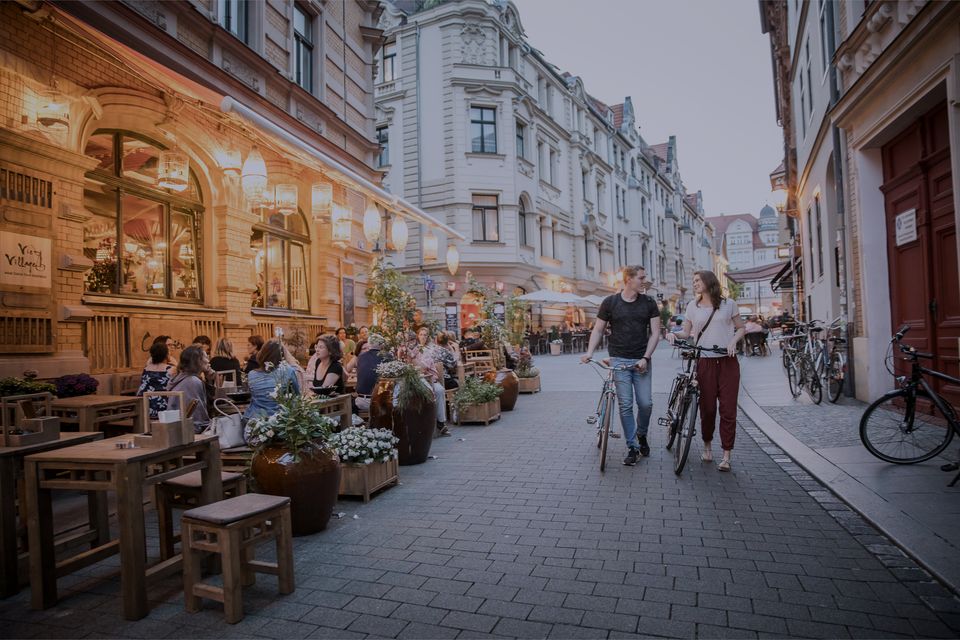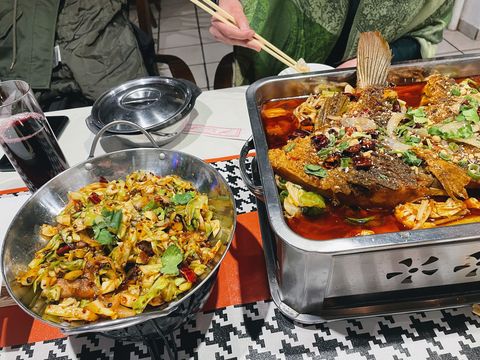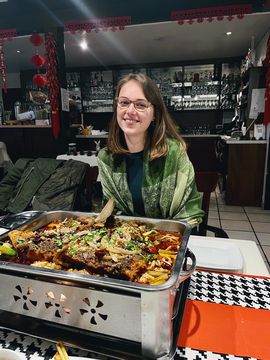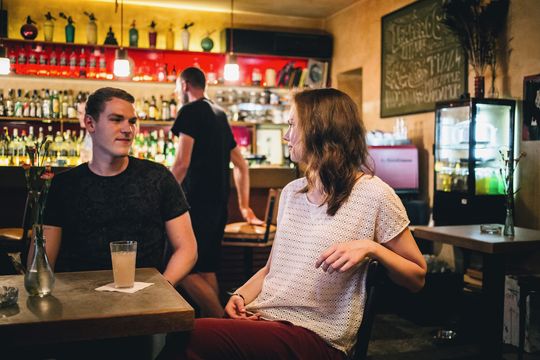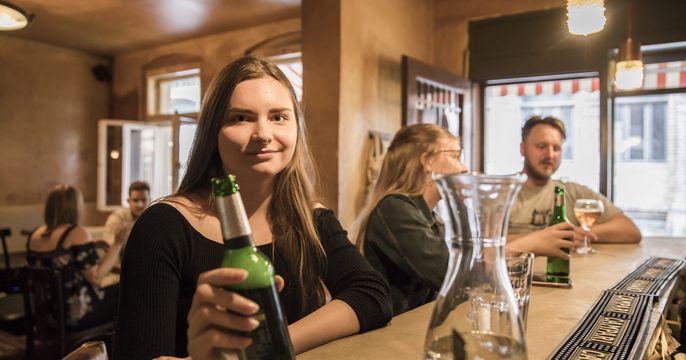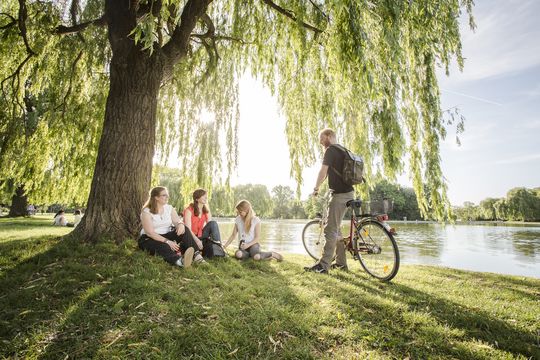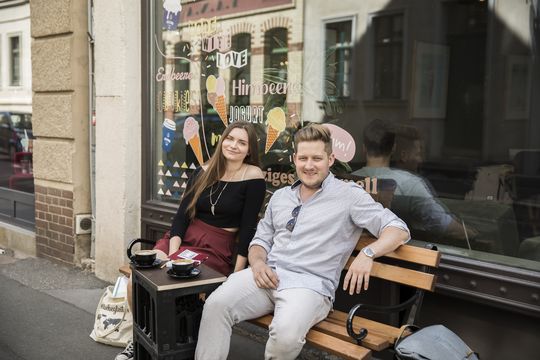Nightlife in Germany
In Germany, friends heading out for a night on the town together often start by gathering at one of their flats – typically in the early evening, around 7:30 p.m. – for a few drinks and a bite to eat. These get-togethers are a nice way to relax, listen to some music together and generally get in the mood before heading out. Of course, sometimes you’ll arrange to meet your friends directly at the bar or pub, but often you’ll find they prefer to start at home – not least because cooking a meal together is cheaper than eating and drinking out.
Our testimonial Jinmeng, for example, recently met up with a friend for dinner at a restaurant.
In most German cities there are no mandatory closing times for pubs, clubs and bars, so there’s no rush. That’s why most people don’t even think about heading out until 11 p.m., and nightclubs don’t start filling up until after midnight.
But when the time comes to hit the town, you’ll find plenty to choose from, as Nathaly, a student from Peru, explains: ‘There are so many nightlife options in Germany. There are clubs and bars where you can go dancing, or just chill out with your friends.’ We’ll get to that soon, but first a word or two about some of the uniquely German things you may encounter en route.
En route
On your way to the bar, pub or club, you’ll pass a number of kiosks, especially if you’re in one of the big cities. Ranging in scale from booths to corner shops and convenience stores, kiosks sell drinks, snacks, newspapers, and a small range of everyday necessities. Some even have outdoor seating, making them the perfect place to catch up with your friends on a warm summer evening. And if you’re heading out for the night, you can buy a drink to have on the way. This is a nice way to keep the party vibe going, plus it’s cheaper than the prices you’ll encounter at the pubs, bars, and clubs – not that they’re especially high by international standards.
Info
Kiosks are known by different names in different parts of Germany. In Berlin, for example, they’re called Spätis (‘late-night shops’); in the Ruhr area they are Trinkhallen (‘drink halls’); and in Cologne they are known affectionately as Büdchen (‘little shops’). In many cities, kiosks are open around the clock – which is a lifesaver if your party has run out of drinks or snacks.
German Kneipe = pub?
The classic German Kneipe is a little bit like a traditional British pub. The main difference is that traditional Kneipen typically don’t have a wide range of food, some may offer a limited selection of chips, Bratkartoffeln (German fries) and the like. Don’t expect cocktails or fancy top-shelf beverages, but do expect a warm, welcoming space where you and your friends can hang out and socialise. Many of these pubs have tables reserved for their regular customers, and some put on live music or poetry readings, or provide a pool table and a dartboard for a cosy night out. It’s a good idea to ask your friends which are the best student pubs in your city.
German bars are similar to pubs, although they tend to be much more hip and modern, especially in the big cities. For example, you’re more likely to find cocktails, long drinks or even mocktails (delicious non-alcoholic cocktails) in a bar. Some bars have live music, DJs, or poetry readings, and some also have a small dance floor.
Student nightclubs
Quite a few universities or higher education institutions, particularly those in smaller towns, have student nightclubs (Studierendenclubs) – function centres that are kind of a cross between a pub, cultural events centre and party venue. Nathaly’s university in Schmalkalden, Thuringia, is a case in point. Its club runs theme parties on Tuesdays and Fridays, where students can relax and socialise. While not exactly discos, these sorts of clubs are a great place to unwind, dance and celebrate the end of a busy day or week. ‘The international students are made to feel very welcome,’ says Nathaly. ‘And it’s great that you don’t have to pay to get in, and the club is not far from the student residence.’ In some places, dedicated student nights of this type are also held at ordinary nightclubs. These events are usually held during the week, and you can get drinks cheaper than on the weekend.
On-campus student bodies and organisations also organise regular parties – generally at the start of the semester. These are a great way to ease back into student life and meet other students.
The international students are made to feel very welcome. And it’s great that you don’t have to pay to get in, and the club is not far from the student residence.
Nathaly
Info
Some clubs and discos have free entry earlier in the evening. If you want to take advantage of this offer, it’s more fun to go with a large group. Otherwise, it might be just you, the bar staff and the DJ – because, as mentioned earlier, these places typically don’t start filling up until after midnight. Having said that, what is a good time to show up varies from region to region and even from club to club, so we can’t provide any definitive guidance here. If you want to know for sure, it’s best to ask someone who is already familiar with the nightlife in your city.
German clubs
The nightclub scene in Germany is extremely diverse, ranging from vast, glitzy dance palaces with multiple dance floors to small, intimate clubs in the basement of historic buildings – so you’re sure to find something that matches your style and taste in music. It’s a good idea to consult your local events calendar before you head out, as many clubs regularly run theme nights dedicated to particular styles of music.
Germany has a very strong techno club scene – and Berlin is its undisputed capital. People from all around flock to the city in huge numbers to party the night away at hotspots like world-famous clubs. They tend to be pretty exclusive, so don’t take it personally if the bouncer won’t let you in. Other nightclubs too – and not just in Berlin – employ door staff to enforce strict entry criteria. If you know someone who is local or has been living in the city for a while, you may want to ask them if the club you’re looking at has a dress code and what the cover charge is. Cover charges (what you pay to get in) vary, and clubs will increase their normal charge if they have a big-name DJ playing.
When the night draws to a close
One thing a lot of people love about German late-night culture is that the partying really does go all night. It’s not at all uncommon to emerge from a nightclub and discover that the sun is already up. In fact, some bars and clubs offer extended hours, commonly called ‘after hours’, so you can keep partying well into the next day.
In some parts of the country, mainly in rural areas, it’s common for groups of revellers to end their night out in style by going from the club to someone’s house for a shared breakfast before everyone heads to their own home and bed, tired but satisfied after a good night out.
Nightlife through the seasons
Autumn and winter
When autumn arrives in Munich, it’s time for the . This is a huge event, famous worldwide, and Nathaly recently had the opportunity to experience it: ‘It was one of the best nights out I’ve had here in Germany, partying in one of the beer tents and dancing to traditional German music’, she says. Festivalgoers generally spend the day and early evening at the Oktoberfest, and then move on to other nightspots and attractions. This is precisely what Nathaly and her friends did: ‘We checked out a few fairground games and then went to a Latino party at the other end of town. It was amazing to experience both cultures in one night.’
The colder months are prime time for poetry readings and in pubs and bars. Winter is also when theatres start their new season, and indoor concerts take place in clubs and other venues. And while most of the nightlife takes place in the warmth and comfort of indoors, there are some notable exceptions. Towards Christmas people like to meet up at for mulled wine or punch and roasted almonds. Then there’s the festival of , which reaches its highpoint in late winter or very early spring with street parades and all manner of festivities.
Spring and summer
When the warmer weather returns, Germany’s nightlife can once again reclaim the outdoors. You can meet up with your friends in parks and waterfront locations, the beer gardens are open again, and in many cities you’ll find outdoor nightclubs and rooftop bars. Summer in Germany also brings numerous outdoor music festivals and open-air concerts, with no end of exciting and fun ways to spend your evenings. There are also lots of free outdoor (just type ‘Umsonst und Draußen Festival’ into your browser), so keep an eye out for these. They are a great way to discover new bands.
In line with this topic
Poetry Slams in Germany
